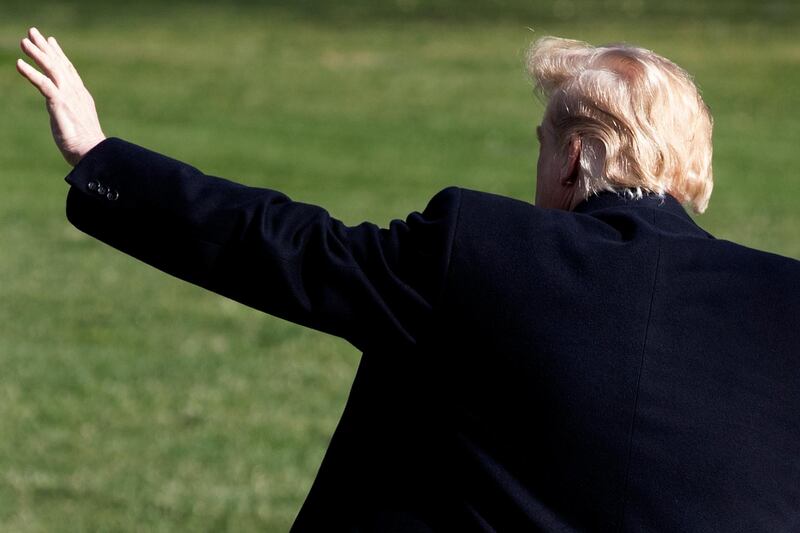Special Counsel Robert Mueller's 300-page report on Russian interference in the 2016 US presidential election has been filed with the Justice Department, but no one else has seen a single sentence of it.
Congress and the public have only a four-page letter from Attorney General William Barr, supposedly summarising its findings.
Mr Mueller was apparently unable to prove a conspiracy by the Trump campaign and Russian intelligence, but unyielding Republican resolve to suppress the report suggests that it, nonetheless, contains highly damaging information.
Mr Trump's victory celebration is at best premature.
He claims complete vindication and exoneration, but the report categorically declines to exonerate him of obstruction of justice.
While Mr Barr and his deputy, Rod Rosenstein, argue that Mr Trump did not obstruct justice in his response to the investigation – including the firing of former FBI director James Comey – Mr Mueller's report obviously also provides grounds for a very different conclusion.
Democrats and much of the public may strongly differ with Mr Barr, once they see the full report – which Mr Mueller says doesn't exonerate the president and which Republicans seem keen to conceal.
The Democrats’ de facto leader, House Speaker Nancy Pelosi, is correct that since the Republican Senate majority is united behind Mr Trump, it’s pointless for the Democratic majority in the House of Representatives to impeach him.
Besides, Democrats think there's an excellent case for defeating Mr Trump in 2020, and many prefer a public repudiation of him and his white-nationalist politics to a parliamentary battle.
Meanwhile, Mr Trump continues to face ominous investigations by New York prosecutors into his businesses, foundation and campaign.
Although the impact on Mr Trump’s long-term viability remains to be seen, two major effects of the Mueller investigation are immediately evident.
First, the criminal convictions of Mr Trump's campaign manager, Paul Manafort, and his deputy, Robert Gates, announce a new era for prosecuting violations of the Foreign Agents Registration Act, which was traditionally barely enforced.
These convictions, and others, signal that international lobbyists in Washington, and even the governments who hire them, must now be very careful about scrupulously adhering to this law.
Second, the reaction of Mr Barr and Mr Rosenstein to the Mueller report highlights one of several serious constitutional malfunctions in the American political system that are only getting worse.
In many ways, US democracy is badly broken. Some of its core structures are either no longer working as designed more than 200 years ago, or have become obsolete and thus dysfunctional.
For example, the federal election system, the electoral college, and several other aspects of the Connecticut Compromise on congressional representation between large and small states, all crafted when the Constitution was adopted at the end of the 18th century, have become, in a drastically changed nation, intolerably distorting.
They are resulting in minority rule by a conservative, rural electorate with far more power per individual voter than the larger, liberal and urban constituencies that mainly power the nation’s culture and economy, but are increasingly politically shortchanged. All this is exacerbated by dark money, gerrymandering, voter suppression and so on.
The Mueller investigation has brought a related conundrum bedevilling US governance into sharp focus: who guards the guardians?
Last year, Mr Barr virtually auditioned for his Attorney General job by writing a public memo denouncing the Mueller investigation and suggesting no president can commit obstruction of justice while conducting the duties of leading the executive branch.
Mr Barr does allow that if a president ordered the destruction of evidence or instructed staffers to commit perjury, that would constitute obstruction. But, he argues, if the president, acting as the government’s chief executive, instructs subordinates like the head of the FBI not to investigate someone or something, that is a judgment that he alone is constitutionally authorised to make and that cannot be second guessed.
Thus far, the handling of the Mueller report is reinforcing this troubling, quasi-monarchical, standard.
It places few constraints on any president inclined to subvert the law-enforcement process to benefit himself and his friends.
In theory, US presidents are checked by Congress, not the police. But political parties did not exist when the Constitution was drafted. It was assumed that Congress would invariably defend legislative prerogatives against an out-of-control executive. In practice, though, legislators defer almost totally to any president of their own party, and reflexively attack one from the other side, preferring organisational loyalty over institutional imperatives. So, the legislative check is generally either insufficient or excessive.
Past efforts to solve this problem, such as the genuinely independent special prosecutors created by the 1978 Ethics in Government Act, proved unsustainable, given that both parties win presidential power.
Republicans, angered by the Iran-Contra investigation, and Democrats, enraged by the Whitewater investigation that led to the impeachment of Bill Clinton, both quietly let the law expire in 1999.
That effectively produced the present scandalous situation, in which presidents apparently possess vast and virtually unfettered authority over federal police investigations, even into themselves, their administrations or their associates.
The US needs a viable process to constrain executive overreach and ensure real independence for investigators scrutinising presidents and their cronies. It’s hardly impossible.
Any well-functioning democracy would move expeditiously to craft one. So, don’t hold your breath.
Hussein Ibish is a senior resident scholar at the Arab Gulf States Institute in Washington





